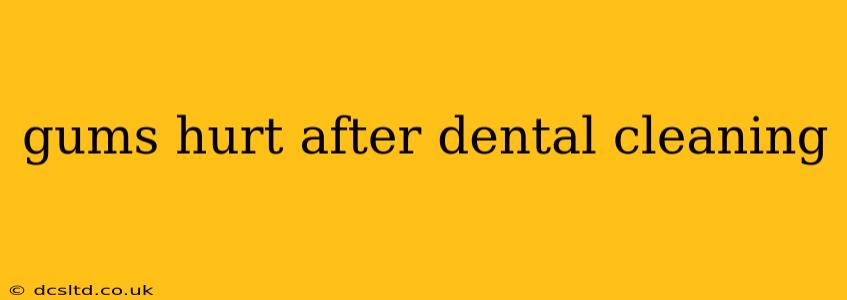A dental cleaning is crucial for maintaining optimal oral health, but sometimes, the aftermath includes sore, tender gums. This isn't uncommon, and while usually temporary, understanding the reasons behind post-cleaning gum soreness can help manage discomfort and prevent future issues. This guide explores the common causes, effective remedies, and preventative measures to ensure your next cleaning is a more comfortable experience.
Why Do My Gums Hurt After a Dental Cleaning?
Several factors can contribute to gum soreness following a professional cleaning. The most common culprits include:
-
Gum Inflammation (Gingivitis): If you have gingivitis, a mild form of gum disease, the cleaning process itself might temporarily irritate already inflamed gum tissue. The hygienist's tools, while designed for thorough cleaning, can stimulate sensitive gums.
-
Aggressive Cleaning: While rare with experienced professionals, overly vigorous cleaning can lead to gum trauma and soreness. The force used during scaling and root planing (removing plaque and tartar) can cause temporary discomfort.
-
Deep Cleaning (Scaling and Root Planing): This procedure, often necessary for those with moderate to severe gum disease (periodontitis), involves removing plaque and tartar from below the gum line. This more invasive approach naturally causes more sensitivity and potential soreness.
How Long Does Gum Soreness Last After a Cleaning?
The duration of gum soreness varies depending on individual factors and the type of cleaning. Generally, mild discomfort lasts only a day or two. However, more intense soreness after a deep cleaning might linger for a few days to a week. If pain persists beyond a week or intensifies, consult your dentist.
What Can I Do to Relieve Gum Soreness After a Cleaning?
Several home remedies can alleviate post-cleaning gum discomfort:
-
Saltwater Rinse: Dissolve half a teaspoon of salt in eight ounces of warm water. Gently swish the solution around your mouth several times a day. The salt's antiseptic properties help soothe inflamed gums and reduce swelling.
-
Over-the-Counter Pain Relief: Nonsteroidal anti-inflammatory drugs (NSAIDs) like ibuprofen can effectively reduce pain and inflammation. Always follow the recommended dosage instructions.
-
Cold Compress: Applying a cold compress to the affected area can help numb the pain and reduce swelling.
-
Gentle Brushing and Flossing: Continue your regular oral hygiene routine, but be extra gentle to avoid further irritation.
How Can I Prevent Gum Soreness After My Next Dental Cleaning?
Prevention is key to minimizing discomfort after your next cleaning. Consider these steps:
-
Maintain Excellent Oral Hygiene: Regular brushing and flossing at home minimize plaque buildup, reducing the need for aggressive cleaning during your appointment.
-
Inform Your Dentist: If you're particularly prone to gum sensitivity, discuss your concerns with your dentist before the cleaning. They may adjust their technique accordingly.
-
Consider a Pre-Cleaning Rinse: Ask your dentist or hygienist about using a numbing rinse before the cleaning to reduce sensitivity.
Is Gum Soreness After a Dental Cleaning Normal?
Yes, some degree of gum soreness after a dental cleaning is perfectly normal, especially after a deep cleaning. However, severe or persistent pain warrants a call to your dentist.
When Should I See My Dentist About Post-Cleaning Gum Pain?
Contact your dentist if:
- The pain is severe or doesn't subside after a few days.
- You experience significant bleeding.
- Your gums remain swollen and red.
- You develop a fever or other signs of infection.
By understanding the causes and remedies for post-cleaning gum soreness, you can better manage discomfort and maintain a healthy smile. Remember, regular dental checkups and proactive oral hygiene are crucial for preventing gum problems and ensuring a comfortable experience during your dental cleanings.
